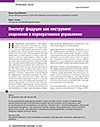The Institute of Fiducia as the Healing Tool in Corporate Governance
Keywords:
,
,
,
,
,
,
In the presented clause analyzes fiduciary principles which allow to soften the conflict of interests between organs of government and shareholders of the company. The author considers the institute of fiducia as one of methods of the decision of an agency problem or a problem «principal-agent». Imposing of fiduciary duties on a management (management, board of directors) allows to estimate the contribution of body of government to result of activity of the company to identify wrongful acts of management (reception of personal rents, fulfillment of obviously unprofitable transactions).
References:
- Jensen M., Meckling W. Theory of the Firm: Managerial Behavior, Agency Costs and Ownership Structure. Journal of Financial Economics, 1976, vol. 3, p. 308.
- Sitkoff R. An Economic Theory of Fiduciary Law. Philosophical Foundations of Fiduciary Law. Edit. Gold A., Miller P. Oxford University Press, 2014.
- Lutsenko S.I. Teorii prioriteta upravleniya kompaniei: balans interesov uchastnikov [Theories of the Company Management Priority: Balancing the Participants’ Interests]. Finansovyi menedzhment, 2011, no 6, p. 48.
- Easterbrook F., Fischel D. Corporate Control Transactions. Yale Law Journal, 1982, vol. 91, p. 702.
- Lutsenko S.I. Direktorat versus sobstvennikov: kognitivnyi dissonans ili balans interesov mezhdu uchastnikami kompanii [Directorate Versus Owners: Cognitive Dissonance or a Balance of Interests Between the Company Participants]. Pravo, Zhurnal Vysshei shkoly ekonomiki, 2015, no 1, p. 204.



